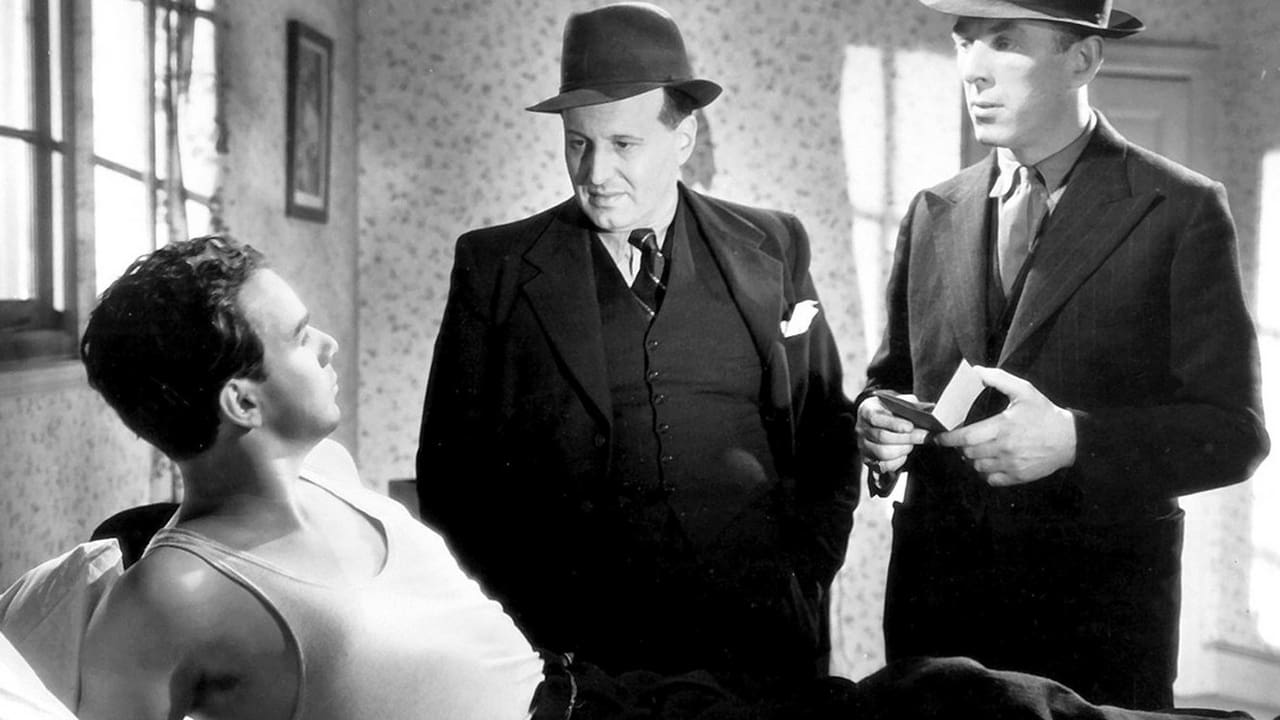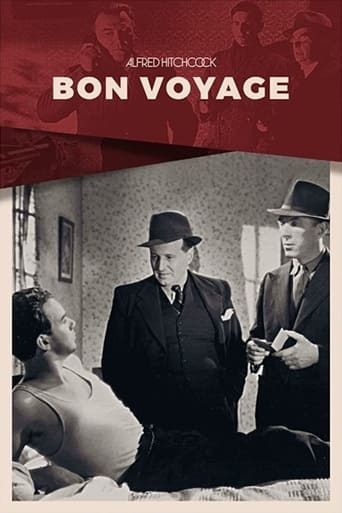

This is How Movies Should Be Made
... View Morejust watch it!
... View MoreThere are moments that feel comical, some horrific, and some downright inspiring but the tonal shifts hardly matter as the end results come to a film that's perfect for this time.
... View MoreA great movie, one of the best of this year. There was a bit of confusion at one point in the plot, but nothing serious.
... View More"Bon Voyage" is a very short propaganda film about the French resistance which Hitchcock did for the war effort in 1944. It was met with disappointment and later shelved.The only person billed is John Blythe; the rest are called "The Moliere Players" to protect them from the Nazis.Blythe plays a Scottish RAF Sgt. John Dougall. He is being debriefed about his escape from France by French intelligence officers in London.Dougall has escaped from a prisoner of war camp along with Stefan Godowski, who actually put the plan together. The two stick together until there is a Resistance-aided pick-up in France by plane. But only one can go, so they shoot dice for it. Dougall is the one to leave. Upon meeting with the Intelligence agents, Dougall says that he hopes Godowski made it and wants to know what happened. As it turns out, although the agents wanted Dougall's story about how he was helped along the way, they already knew it.Good story, but it was too low-key for what the government wanted from Hitchcock - a real rah-rah story and big ending concerning the Resistance.Instead, it showed ordinary people taking risks, which I found moving and effective.An old woman I knew was in Vienna studying just before the war broke out and, for academic reasons, went looking for Heinrich Mann, who was hiding out in France. (And I just saw a film about this very thing, Varian's War). On the beach, she saw a man and woman playing ball on the beach, and the ball kept landing near her. They turned out to be members of the Resistance. I believe she did find Mann in a bar somewhere, but what impressed her (and me) is that this couple told her that they would never quit their work until Nazism was defeated.In the end, I think Hitchcock told the right story. It's not the big triumph but the work that people do leading up to it, sometimes small things, that win a war.
... View MoreComing from someone who considers Alfred Hitchcock her all-time favourite director, both Aventure Malgache and Bon Voyage are interesting curiosities but neither see Hitchcock at his best. While I didn't think much of Aventure Malgache, Bon Voyage was very well-done and you can see why Hitchcock himself was fond of it. The script is lacking in tautness and has a tendency to plod and a couple of the flashbacks flow a little too stiffly, even with those there is much to recommend. While Bon Voyage doesn't quite have Hitchcock all over it or see him show what he was most good at, there is more evidence of his directing style than in Aventure Malgache, the suspense levels are not exactly strong but Bon Voyage is not dull either and has some fun to it. The camera work is clever and meticulously composed and the crisp black and white also impresses. The score is a good mix of haunting and playful, while the story is simpler, much less confused and has some nice twists and turns. Unlike Aventure Malgache, Bon Voyage thankfully is not too dialogue heavy, the French are portrayed more sensitively and the propaganda elements, while also on the dated side, more subtly handled. John Blythe is decent in the lead role. To conclude, not a classic but it is not bad at all and of Hitchcock two French shorts he made in the 40s this is the far superior of the two. 7/10 Bethany Cox
... View MoreShot in 1944 entirely in French (version seen has English subtitles), in style rather like a short section of a budget version of his "Lady Vanishes", it must have been intended for clandestine distribution in occupied and Vichy France. For this reason and the fact that it appears to have a clear practical purpose it presumably is a training film. It is thus not primarily a tribute to the French Resistance, its purpose seems instead to be to warn them of a dangerous new Gestapo method of infiltration. Hitchcock's contribution was to make the message clear and hold the attention.It concerns the return to England of a British air-gunner (played by English actor John Blythe in French) recently escaped from a German prisoner of war camp. He has safely arrived back in London due to the help he received from the French Resistance and is being de-briefed by French exile officers. What should though have been a happy conclusion to a successful escape is soured when the true tragic facts are revealed to him that he has been an innocent pawn in a dastardly Gestapo design for the infiltration of the French resistance network. In this he was made a carrier of something deadly - not disease but something similarly poisonous - that he had been made to unwittingly expose members of the Resistance. One guesses that the main purpose of the film was to warn everyone of this.
... View MoreA delightful little propaganda film and more than just a curiosity for Hitchcock fans. The plot is about an RAF pilot who was shot down, escapes through France and is debriefed by French officials. He is helped along in his escape by courageous members of the French Underground and a co-escapist. His recounting of the events which allowed his return to England are given a very interesting spin by the French officials.A companion with Hitchcock's other WWII French film 'Aventure Malagache,' 'Bon Voyage' was an attempt to buoy French spirits. I love the fact that the film is SUPPOSED to be a celebration of the daring and heroism of ordinary French civilians who've joined the Underground to fight the Nazis. Buried under the surface there are strong suggestions that being part of the underground will probably get you killed and that you should keep your mouth shut because German agents are everywhere. Heroism and sacrifice rule the day though and it is these two things which Hitchcock was attempting to realistically celebrate.Given a limited showing throughout the Free French regions, 'Bon Voyage' remained a film that Hitchcock was fond of and was a film that Hitchcock considered expanding into a full feature after the war. Although lost in the shuffle and neglected by time, this isn't a bad film. It just remains under-exposed and under-appreciated.
... View More